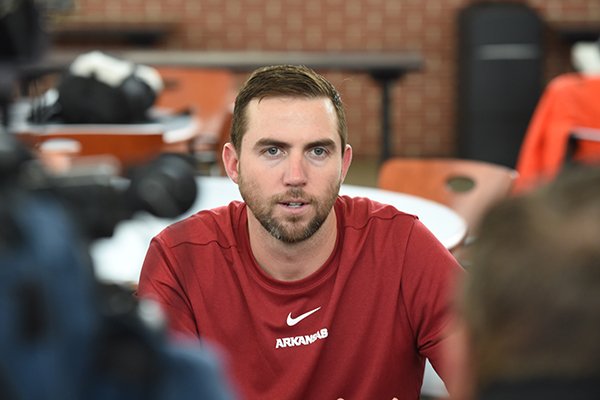FAYETTEVILLE — Arkansas offensive coordinator Kendal Briles and defensive coordinator Barry Odom have gone back to square one and not assumed their players have retained information previously given to them.
The Razorbacks' new offensive and defensive coordinators can afford to do so because they now have time. From April 20-May 31, coaches in all Division I sports will be able to hold up to eight hours of virtual meetings and instruction per week with their players.
To this point, they said, meetings have been productive and guys have been on time, receptive and attentive.
"They’re hungry to learn. They’ve got both feet in, and what we’re doing program-wise, we’ve adjusted and handled things," Odom said Friday during an hour-long teleconference. "Who knows how much longer of this we’ve got, but they’ve done such a tremendous job, and it starts with the leadership of (Arkansas head coach Sam Pittman).
"We’ve been able to teach, we’ve been able to be slow and intentional with the content that we’re giving them in our position meetings. Then, those guys, you can tell they’ve been spending time on their own in the playbook, so to speak, so I’m proud of them. But we’ve got a long way to go to get in position of where we need to be whenever this ends."
Odom added that he feels as if he has become a better teacher during this time. He, of course, is taking everything day by day but is continually pushing players, motivating them and providing an opportunity to learn at their own pace.
Everyone learns differently.
"There’s so many different layers to (coaching)," Odom said. "At the end of the day, man, you’re a teacher. You’ve got to be able to provide the content. Some guys learn by drawing the plays and the blitzes. Some guys, they’ve got to see it visually. Some guys have to walk through it.
"The things that we do between now and (when the season begins) is going to make sure that we’re ready for when that time comes, and that whenever we can hit the field that we’re ready to go with the install and how we’re going to go practice and the habits and all the things that our kids have stayed up on. They’ve done a tremendous job.”
On the offensive side, Briles noted that players, using an app, are given assignments and quizzes on information discussed in meetings. Once they are graded, offensive staff will go back over the information the following day.
Briles said meetings have been great and players have enjoyed them. He was complimentary of the technology used to teach his unit.
"Our video guys have done a great job of setting us all up and making this a really streamlined way to do it, so that part of it has been really easy," Briles said. "(For quarterbacks), we try to change it up and throw on a YouTube video of Drew Brees one day and try not to be so monotonous with it.
"But at the end of the day, it is a meeting, we are teaching football, learning football."
Because he cannot have in-person interaction with players until at least May 31, Briles is doing more prep work for virtual meetings than he would a standard meeting.
"We’re not able to show them things and me signal in front of them and those things," he said. "An hour meeting every day, there’s a lot of things you can cover in an hour. Our support staff and (graduate assistants) have done a tremendous job of getting all of that ready for everybody offensively.
"Our guys have done a really great job with it."
Defensively, the Razorbacks have more installed right now than they would if they were wrapping up spring practice, Odom said. He has been heavy on install since arriving at Arkansas and will soon begin re-teaching the basics.
If you ask Briles, there is enough time to install his entire playbook. But will players be able to carry instruction to the field when they are allowed?
"You’ve got to be mindful of the players and what they can execute and not try to put too much on them and you’ve got to be good at some things," he said. "That’s a balance that once you get into it, you trust your instincts and you trust your coaches.
"You try to make the best decisions to give you a chance to be successful."

